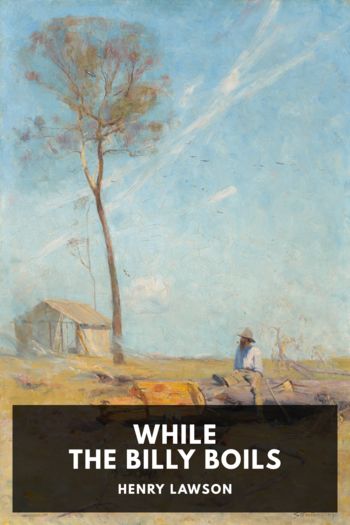While the Billy Boils, Henry Lawson [hardest books to read .txt] 📗

- Author: Henry Lawson
Book online «While the Billy Boils, Henry Lawson [hardest books to read .txt] 📗». Author Henry Lawson
We took a turn on deck before turning in, and heard two men arguing about the way in which the Dunbar was wrecked.
The commercial travellers, the jeweller, and one or two new chums who were well provided with clothing undressed deliberately and retired ostentatiously in pyjamas, but there were others—men of better days—who turned in either very early or very late, when the cabin was quiet, and slipped hurriedly and furtively out of their clothes and between the blankets, as if they were ashamed of the poverty of their underwear. It is well that the Lord can see deep down into the hearts of men, for He has to judge them; it is well that the majority of mankind cannot, because, if they could, the world would be altogether too sorrowful to live in; and we do not think the angels can either, else they would not be happy—if they could and were they would not be angels any longer—they would be devils. Study it out on a slate.
We turned in feeling comfortably dismal, and almost wishing that we had gone down with the Dunbar.
The intoxicated shearers and the dude kept their concert up till a late hour that night—or, rather, a very early hour next morning; and at about midnight they were reinforced by the commercial traveller and Moses, the jeweller, who had been visiting acquaintances aft. This push was encouraged by voices from various bunks, and enthusiastically barracked for by a sandy-complexioned, redheaded comedian with twinkling grey eyes, who occupied the berth immediately above our own.
They stood with their backs to the bunks, and their feet braced against the deck, or lurched round, and took friendly pulls from whisky flasks, and chyacked each other, and laughed, and blowed, and lied like—like Australian bushmen; and occasionally they broke out into snatches of song—and as often broke down. Few Englishmen know more than the first verse, or two lines, of even their most popular song, and, where elevated enough to think they can sing, they repeat the first verse over and over again, with the wrong words, and with a sort of “Ta-ra-ra-rum-ti-tooral, ta-ra-ra-ra-ra-rum-ti, ta-ra-ra-rum-tum-ti-rum-rum-tum-ti-dee-e-e,” by way of variation.
Presently—suddenly, it seemed to our drowsy senses—two of the shearers and the bagman commenced arguing with drunken gravity and precision about politics, even while a third bushman was approaching the climax of an outback yarn of many adjectives, of which he himself was the hero. The scraps of conversation that we caught were somewhat as follow. We leave out most of the adjectives.
First Voice: “Now, look here. The women will vote for men, not principles. That’s why I’m against women voting. Now, just mark my—”
Third Voice (trying to finish yarn): “Hold on. Just wait till I tell yer. Well, this bloomin’ bloke, he says—”
Second Voice (evidently in reply to first): “Principles you mean, not men. You’re getting a bit mixed, old man.” (Smothered chuckle from comedian over our head.)
Third Voice (seeming to drift round in search of sympathy): “ ’You will!’ sez I. ‘Yes, I will,’ he sez. ‘Oh, you will, will yer?’ I sez; and with that I—”
Second Voice (apparently wandering from both subjects) “Blanker has always stuck up for the workin’ man, an’ he’ll get in, you’ll see. Why, he’s a bloomin’ workin’ man himself. Me and Blanker—”
Disgusted voice from a bunk: “Oh, that’s damn rot! We’ve had enough of lumpers in parliament! Horny hands are all right enough, but we don’t want any more blanky horny heads!”
Third Voice (threateningly): “Who’s talkin’ about ’orny heads? That pitch is meant for us, ain’t it? Do you mean to say that I’ve got a ’orny head?”
Here two men commenced snarling at each other, and there was some talk of punching the causes of the dispute re horny heads; but the bagman interfered, a fresh flask was passed round, and some more eternal friendship sworn to.
We dozed off again, and the next time we were aware of anything the commercial and Moses had disappeared, the rest were lying or sitting in their bunks, and the third shearer was telling a yarn about an alleged fight he had at a shed upcountry; and perhaps he was telling it for the benefit of the dissatisfied individual who made the injudicious remark concerning horny heads.
“So I said to the boss-over-the-board, ‘you’re a nice sort of a thing,’ I sez. ‘Who are you talkin’ to?’ he says. ‘You, bless yer,’ I says. ‘Now, look here,’ he says, ‘you get your cheque and clear!’ ‘All right,’ I says, ‘you can take that!’ and I hauled off and landed him a beauty under the butt of the listener. Then the boss came along with two blacklegs, but the boys made a ring, and I laid out the blanks in just five minutes. Then I sez to the boss, ‘That’s the sort of cove I am,’ I sez, ‘an’ now, if you—”
But just here there came a deep, growling voice—seemingly from out of the depths of the forehold—anyway, there came a voice, and it said:—
“For the Lord’s sake give her a rest!”
The steward turned off the electricity, but there were two lanterns dimly burning in our part of the steerage. It was a narrow compartment running across the width of the boat, and had evidently been partitioned off from the top floor of the hold to meet the emigration from Australia to New Zealand. There were three tiers of bunks, two deep, on the far side, three rows of single bunks on the other, and two at each end of the cabin, the top ones just under the portholes.
The shearers had turned in “all standing;” two





Comments (0)